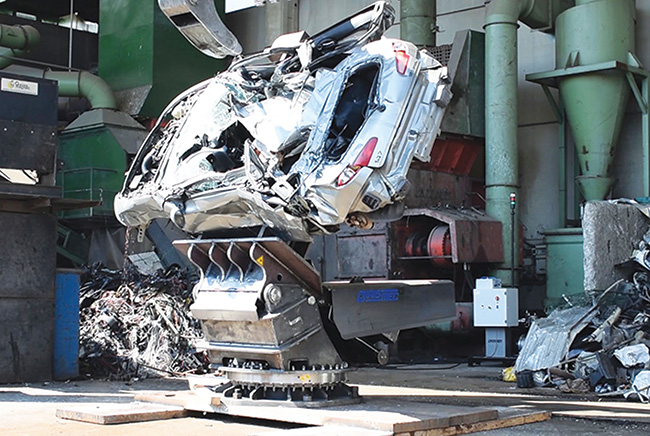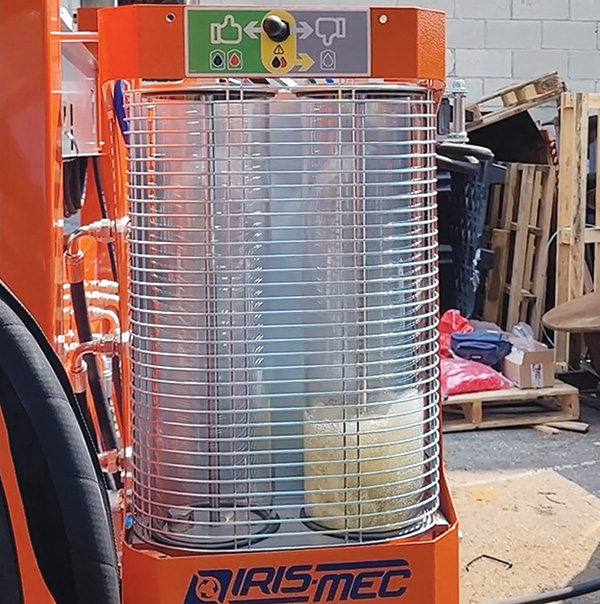Discussing compliant auto recycling options for auto recyclers concerned about profit loss and increased labor.
By Sean Abenstein
The Recycling of end-of-life vehicles (ELVs) is undergoing significant changes, mainly due to growing environmental concerns and evolving government regulations. As countries tighten their control over emissions and promote sustainable practices, the U.S. is taking steps to align its auto recycling industry with global standards. Auto recyclers who adhere to these standards can benefit in several ways, including avoiding fines, becoming eligible for government incentives, expanding their customer base, and enhancing their reputation. However, some business owners may be hesitant to fully comply or may comply reluctantly. Compliance often comes with its own set of challenges, such as increased labor, longer production cycles, and additional training, which hinder a business’ ability to remain competitive and profitable.


exponentially. Photos courtesy of Gensco Equipment
Equipment suppliers play an important role in addressing this challenge. Suppliers need to direct transformation by making it easier for auto recyclers to meet the demands of a changing world without compromising their time and finances. One noteworthy partnership contributing to this transformation is between Gensco Equipment and Iris-Mec Srl. This partnership aims to assist recyclers in North America, Mexico, and many parts of Latin America in seamlessly adapting to these changing times (see The Power of Partnerships sidebar). While governments prioritize environmental concerns, it is essential for equipment suppliers to support recyclers without adversely affecting their bottom line. This article will discuss the evolving trends in end-of-life vehicle recycling.

Navigating New Regulations: “Required Regulations”
A significant turning point for the auto recycling industry in the U.S. came as the EPA began regulating stricter guidelines for responsible ELV recycling. This landmark legislation solidified the commitment to controlling harmful emissions, aligning with practices that have long been established in Europe, Asia, and other regions.
As the rules and regulations have undergone substantial changes, we are witnessing a transformation where environmental responsibility and sustainable practices are no longer choices but necessities. The Clean Air Act mandates a comprehensive approach, requiring the thorough removal of ozone-depleting substances, oils, fluids, and other hazardous materials from ELVs before the shredding process. Auto recyclers have been acquiring equipment to meet these drastic changes.
The Power of Partnerships: Gensco Equipment and Iris-Mec
With more than a century of industry presence, Gensco has not only withstood the test of time, but has also emerged as a leading force in adopting cutting-edge solutions. In this era of transformation, partnerships such as the one between Gensco Equipment and Iris-Mec set an example of how to support those most affected—recyclers. Iris-Mec, a trailblazer in Europe and Asia, is already well known in ELV recycling. This partnership now brings together Iris-Mec’s unparalleled expertise and Gensco’s industry legacy, combining a fantastic product with a name companies trust.
The partnership with Iris-Mec is truly a game-changer. Their pioneering advancements in Europe and Asia have set the gold standard in efficient vehicle depollution and auto dismantling. Now, with Gensco’s extensive network and expertise, they are bringing this transformative technology to the Americas. This collaboration is remarkable. Gensco Equipment, with its 104-year history, has always been forward-looking, seeking the right partners to uphold their standards of excellence in quality and innovation. Iris-Mec’s technology aligns perfectly with Gensco Equipment’s vision, allowing them to create effective distribution channels in North America, Mexico, and various parts of Latin America.
Enhancing Efficiency: Balancing Compliance and Profitability
Finding the balance between compliance and profitability is crucial for survival in today’s auto recycling market. This is a complex and challenging effort. Smart technology plays a vital role in striking the right balance. By using equipment such as advanced and collaborative pneumatic systems, remotely operated precision drill pumps, and multi-tasking machinery within a comprehensive system, the depollution process is transformed. Leveraging intelligent software and automation while prioritizing safety and ease of use, as well as a seamless process for fluid removal, separation, fluid integrity, and containment can streamline the entire compliance workflow while boosting profitability.


Automation: Paving the Way for Transformation
Automation is a common theme in modernization efforts within the auto recycling industry. From basic software to advanced robotics, automation is pivotal in aligning compliance with profitability. Automation forms the foundation for future solutions. Software now meticulously records fluid inventory and associates it with each ELV, ensuring a proper compliance trail. On the other end of the spectrum, robotic clamp tables, in conjunction with precision dismantling arms, all managed remotely, offer a whole new level of efficiency. These solutions expedite processes, free up dedicated excavators for other work, increase safety, and bolster profitability with very fast processing cycles.
Unveiling Added Value: Innovations for Profit
Innovation has the potential to unlock previously untapped value within the recycling process. The transformative role of advanced equipment is paramount. Granulator/separator systems exemplify this potential, significantly increasing the value of aluminum and copper in wires. These systems reduce shipping costs and enhance overall value of scrap wire. When investing in a granulation plant, consider systems that use a turbo-mill system to liberate all copper and aluminum fines from the wire harness to maximize recovery and profitability. The inclusion of tire/wheel separators is another demonstration. Unlike rim or wheel crushers, wheel separators recover aluminum rims without breaking them into scattered pieces. To be compliant, the rim is damaged sufficiently to no longer be roadworthy. By retaining the structural integrity of the aluminum rim, the value of recycled material can be confirmed by analysis, effectively enhancing their resale potential.
Key Points
1. Environmental Responsibility and Compliance Government regulations, such as those laid out by the Clean Air Act in the U.S., have made it clear that responsible ELV recycling is no longer
optional. These regulations necessitate the thorough removal of hazardous materials from ELVs, aligning with global standards.
2. Challenges in Balancing Compliance and Profitability
Auto recyclers face a significant challenge in striking the right balance between compliance and profitability. Compliance often comes with increased labor, longer production cycles, and additional training, which can hinder competitiveness.
3. Role of Equipment Suppliers
Equipment suppliers are pivotal in helping recyclers adapt to these changing regulations while ensuring their financial viability. They are ultimately responsible for producing innovative solutions to support recyclers in the Americas and foster seamless transitioning as the U.S. aligns itself with global auto recycling standards.
4. Automation and Efficiency
Automation is emerging as a crucial tool in achieving compliance without sacrificing profitability. Advanced technologies, such as robotic systems and intelligent software, streamline the depollution process, record fluid inventory, and enhance overall efficiency.
5. Unlocking Added Value through Innovation
Innovations in equipment, such as granulator/separator systems, tire/wheel separators, offer opportunities to unlock added value within the recycling process. These systems increase the recovery and resale potential of valuable materials like aluminum and copper.
Embracing Environmental Responsibility
The landscape ELV recycling demands a paradigm shift for auto recyclers. ELV recycling in the Americas is undergoing a profound transformation driven by growing environmental concerns and evolving government regulations. This shift towards sustainability and compliance with stricter guidelines has far-reaching implications for the auto recycling industry.
Embracing environmental responsibility and compliance is not only essential for avoiding fines and accessing government incentives, but also for expanding customer bases and enhancing reputations. The industry’s future lies in the synergy between technological advancements, sustainability, and profitability, ultimately, fostering a more environmentally responsible and economically viable auto recycling sector in the Americas. | WA
Sean Abenstein has been a Senior Sales and Operations Consultant in the waste industry for more than 20 years. In his role as Chief Commercial Officer for Gensco Equipment, he continues to provide consulting and strategic expertise and has been published in several magazines and articles. His extensive knowledge of the recycling and demolition industry has made him an invaluable resource for thousands of owners, operators, and dealers over the years. Sean can be reached at (416) 465-7521, ext. 202, or e-mail [email protected].
